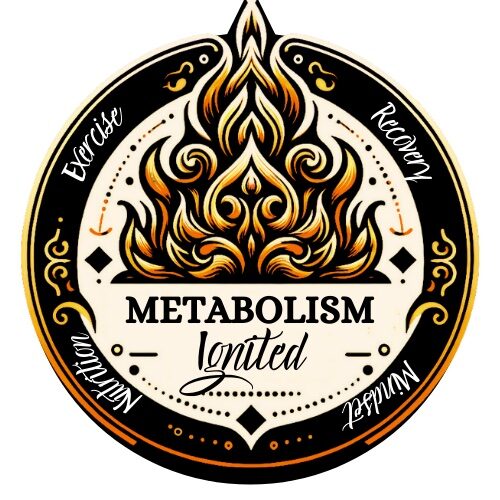It’s important to fuel your body with the right nutrients to help boost your metabolism naturally. By incorporating metabolism-boosting foods into your diet and following some simple tips, you can kickstart your body’s natural fat-burning abilities. In this article, we’ll explore the best nutrition tips to rev up your metabolism and support a healthy, active lifestyle.

Key Takeaways:
- Nutrition plays a crucial role in boosting metabolism naturally: Eating a balanced diet with the right nutrients can help enhance metabolic rate and support overall energy levels.
- Foods that boost metabolism naturally are rich in protein, fiber, and healthy fats: Incorporating foods like lean proteins, whole grains, fruits, vegetables, and nuts into your diet can help increase metabolism and promote weight loss.
- Opt for a metabolism-boosting diet high in antioxidants and vitamins: Consuming foods rich in antioxidants, such as berries, green tea, and leafy greens, can help speed up metabolism and improve overall health.
Building a Metabolism-Boosting Diet
Your metabolism is a crucial factor in determining how efficiently your body converts food into energy. By focusing on wholesome, nutrient-dense foods, you can optimize your metabolism for better energy levels and overall health.
Focus on Whole Foods
An essential aspect of boosting your metabolism naturally is to consume a diet rich in whole, unprocessed foods. These foods deliver a wide array of vitamins, minerals, and antioxidants that support metabolic function and overall health. Opt for fresh fruits and vegetables, lean proteins, whole grains, and healthy fats to fuel your metabolism effectively.
- Affiliate Product: Nature’s Way Organic Extra Virgin Coconut Oil – A great addition to your diet for healthy fats that support metabolism.
Incorporate Metabolism-Boosting Foods
Foods that naturally boost metabolism include spicy ingredients like chili peppers, lean proteins such as chicken and fish, and high-fiber foods like beans and whole grains. These foods can help increase your metabolic rate and support weight management when included as part of a balanced diet.
- Affiliate Product: Organic Matcha Green Tea Powder – Incorporate this metabolism-boosting beverage into your daily routine.
Hydrate with Metabolism-Friendly Beverages
Metabolism-boosting beverages like green tea and water with lemon can enhance hydration levels and support metabolic function. Staying adequately hydrated is vital for maintaining optimal metabolism and overall health. These beverages can also provide additional antioxidants and nutrients that support metabolism and overall well-being.
- Affiliate Product: Bigelow Green Tea with Lemon – A refreshing and metabolism-friendly drink to keep you hydrated.
Protein Power for Metabolism
Importance of Protein for Metabolism
One key component of a metabolism-boosting diet is protein. Protein plays a crucial role in boosting metabolism as it requires more energy to digest compared to fats or carbohydrates, leading to a higher metabolic rate. Additionally, protein is imperative for building and maintaining muscle mass, which can further increase your body’s calorie-burning potential.
High-Protein Foods to Boost Metabolism
Protein-rich foods are vital for naturally boosting metabolism. Incorporating sources of lean protein such as chicken, fish, legumes, and tofu into your diet can help increase your metabolic rate and aid in weight management. For instance, a grilled chicken salad or a post-workout smoothie with protein powder are excellent choices to support a faster metabolism.
- Affiliate Product: Optimum Nutrition Gold Standard 100% Whey Protein – A convenient source of protein to support metabolism and muscle growth.
Timing of Protein Intake for Optimal Metabolism
Intake of protein is also crucial for maximizing your metabolism. Consuming protein-rich foods throughout the day, especially at breakfast and post-workout, can help keep your metabolism elevated. A study published in the American Journal of Clinical Nutrition found that spreading protein intake evenly throughout the day can enhance metabolism and promote weight loss.
Healthy Fats for a Faster Metabolism
The Role of Healthy Fats in Metabolism
For optimal metabolism, incorporating healthy fats into your diet is important. Healthy fats play a crucial role in supporting metabolic function by providing a concentrated source of energy for the body. They also help regulate hormone levels and support the absorption of fat-soluble vitamins that are important for overall health.
Foods Rich in Healthy Fats to Boost Metabolism
Fats are an important component of a metabolism-boosting diet. Include foods such as avocados, nuts, seeds, and olive oil in your meals as they are rich in healthy fats that can help increase your metabolic rate. Incorporating these foods into your diet not only supports metabolism but also provides necessary nutrients for overall well-being.
- Affiliate Product: California Olive Ranch Extra Virgin Olive Oil – A high-quality source of healthy fats to enhance your diet.
Balancing Omega-3 and Omega-6 Fatty Acids
For optimal metabolic function, it’s important to balance the intake of omega-3 and omega-6 fatty acids in your diet. Omega-3 fatty acids, found in fatty fish like salmon and flaxseeds, have anti-inflammatory properties that support cellular health and metabolic function. On the other hand, omega-6 fatty acids, found in vegetable oils and processed foods, can promote inflammation if consumed in excess.
Complex Carbohydrates for Sustained Energy
Keep your metabolism revved up by choosing the right carbohydrates to fuel your body efficiently. Complex carbohydrates are a great choice as they provide a steady release of energy throughout the day, keeping your metabolism humming along. Examples of complex carbohydrates include whole grains, legumes, and root vegetables.
Choosing the Right Carbohydrates for Metabolism
Carbohydrates are crucial for providing your body with the energy it needs to function optimally. When selecting carbohydrates, opt for whole grains like quinoa, brown rice, and oats, which are packed with fiber and nutrients that support a healthy metabolism. Avoid refined carbohydrates like white bread and sugary snacks, as they can lead to energy crashes and slow down your metabolism.
- Affiliate Product: Bob’s Red Mill Organic Quinoa – A nutritious whole grain that supports sustained energy and a healthy metabolism.
Whole Grain Foods to Boost Metabolism
An important aspect of boosting your metabolism naturally is incorporating whole grain foods into your diet. Whole grains are rich in fiber, which helps regulate digestion and keep blood sugar levels stable. This, in turn, supports a healthy metabolism and can aid in weight management.
- Affiliate Product: Nature’s Path Organic Whole Grain Oats – A fiber-rich whole grain to keep your metabolism steady.
Fruits and Vegetables for a Healthy Metabolism
For a metabolism-boosting diet, prioritize fruits and vegetables that are rich in vitamins, minerals, and antioxidants. These nutrient-dense foods not only support overall health but also help keep your metabolism functioning at its best. Incorporate a variety of colorful fruits and vegetables into your meals to reap their metabolism-boosting benefits.
Healthy options include leafy greens, berries, citrus fruits, and cruciferous vegetables like broccoli and Brussels sprouts. These foods not only provide crucial nutrients but also support efficient metabolism and overall well-being.
Spices and Herbs to Boost Metabolism
The Metabolic Benefits of Spices and Herbs
Unlike processed foods, spices and herbs are not only flavorful additions to your meals but also offer numerous health benefits, including boosting your metabolism naturally. These plant-based ingredients are packed with antioxidants, vitamins, and minerals that support overall wellness and can help enhance your body’s metabolic function.
Cinnamon, Cayenne, and Ginger for Metabolism
Spices like cinnamon, cayenne pepper, and ginger have been shown to have metabolism-boosting properties. Cinnamon, for example, helps regulate blood sugar levels, which can prevent spikes and crashes that may slow down your metabolism. Cayenne pepper contains capsaicin, a compound known for its ability to increase calorie burning and fat oxidation. Ginger aids in digestion and can enhance thermogenesis, the process by which your body burns calories to produce heat.
- Affiliate Product: Frontier Co-op Organic Ground Ceylon Cinnamon – Add this metabolism-boosting spice to your diet for enhanced metabolic function.
Other Metabolism-Boosting Spices and Herbs
Herbs such as turmeric, black pepper, and green tea can also support a healthy metabolism. Turmeric contains curcumin, a powerful anti-inflammatory compound that may help improve insulin sensitivity and promote fat loss. Black pepper enhances the bioavailability of other nutrients, allowing your body to better absorb vital vitamins and minerals. Green tea is rich in catechins, antioxidants that have been shown to increase metabolism and promote fat oxidation.
Lifestyle Changes to Support Metabolism
Getting Enough Sleep for Metabolism
All too often, we underestimate the power of a good night’s sleep on our metabolism. Research has shown that inadequate sleep can disrupt metabolic processes, leading to decreased energy expenditure and potential weight gain. Aim for 7-9 hours of quality sleep each night to support optimal metabolism function.
Reducing Stress for a Healthy Metabolism
With our fast-paced lifestyles, chronic stress has become a common problem that can negatively impact metabolism. High levels of stress hormones like cortisol can slow down metabolism and contribute to weight gain. Incorporate stress-reducing activities such as meditation, yoga, or deep breathing exercises into your daily routine to support a healthy metabolism. Stress management is crucial for overall health, including metabolism. Chronic stress can lead to imbalances in hunger hormones, increased fat storage, and decreased energy expenditure. Prioritize stress reduction techniques to help maintain a healthy metabolism.
- Affiliate Product: [CALM Magnesium Supplement](https://www.amazon.com/dp/B00.
Incorporating Physical Activity into Daily Life
Activity plays a vital role in boosting metabolism and supporting overall health. Regular exercise can increase muscle mass, which in turn boosts resting metabolic rate. Aim for a mix of cardiovascular and strength-training exercises to maximize metabolism benefits.
Physical activity not only burns calories but also has long-term benefits for metabolism. Incorporate movement into your daily routine by taking the stairs, going for walks, or trying new fitness classes to keep your metabolism revved up.
Summing up
To wrap up, incorporating proper nutrition and healthy eating habits is crucial in naturally boosting your metabolism. By consuming metabolism-boosting foods such as lean proteins, whole grains, fruits, vegetables, and healthy fats, you can support your body’s natural metabolic processes. Additionally, staying hydrated, getting enough quality sleep, and engaging in regular physical activity are all important factors in maintaining a healthy metabolism.
With a well-rounded approach that includes a balanced diet rich in nutrients and a healthy lifestyle, you can effectively support your metabolism and promote overall wellness. Keep in mind, small changes in your daily routine can have a big impact on your metabolism and energy levels in the long run. By making mindful choices and prioritizing your health, you can optimize your metabolism and feel your best.
